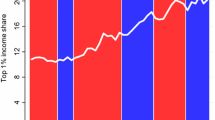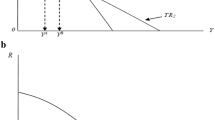Abstract
This paper asks the question whether political ideology affects economic growth. Voters may demand inefficient levels of redistribution and government intervention, and they may care too little for aspects that really matter for the economy. Their norms and perceptions of society might, via their political ideology, affect economic performance. The paper presents evidence suggesting that rightwing societies have grown faster in the last decades than other democratic societies. Further analysis suggests that these societies develop better legal systems and less government intervention, which in turn explain some but not all of the growth difference.
Similar content being viewed by others
References
Alesina, A., di Tella, R., & MacCulloch, R. (2001). Inequality and happiness: Are Europeans and Americans different? NBER Working Paper no. 8198.
Barro, R. J. (1991). Economic growth in a cross-section of countries. Quarterly Journal of Economics, 106(2), 407–443.
Barro, R. J. (1997). Determinants of economic growth: A cross-country empirical study. Cambridge, MA: MIT Press.
Barro R. J., & Lee, J-W. (1993). International comparisons of educational attainment. Journal of Monetary Economics, 32(3), 363–394.
Beck, T., Clarke, G., Groff, A., Keefer. P., & Walsh, P. (2001). New tools in comparative political economy: The database of political institutions. World Bank Economic Review, 15(1), 165–176.
Carlsson, F., & Lundström, S. (2002). Economic freedom and growth: Decomposing the effects. Public Choice, 112(3), 335–344.
Deininger, K., & Squire, L. (1996). A new data set measuring income inequality. World Bank Economic Review, 10(3), 565–569.
Downs, A. (1957). An economic theory of democracy. New York: Harper and Row.
Freedom House. (2003). Freedom in the world 2003. The annual survey of political rights and civil liberties. Lanham: Rowman and Littlefield.
Glaeser, E. L., & Schleifer, A. (2002). Legal origins. Quarterly Journal of Economics, 117(4), 193–1230.
Gwartney, J., & Lawson, R. (2001). Economic freedom of the world: 2001 annual report. Vancouver: Fraser Institute.
Haan, J. de, & Sturm, J-E. (2000). On the relationship between economic freedom and economic growth. European Journal of Political Economy, 16(2), 215–241.
Kau, J. B., & Rubin, P. H. (2002). The growth of government: Sources and limits. Public Choice, 113(3), 389–402.
Keefer, P., & Knack, S. (2002). Polarization, politics and property rights. Links between inequality and growth. Public Choice, 111(1–2), 127–154.
Knack, S. (2002). Social capital and the quality of government: Evidence from the U.S. states. American Journal of Political Science, 46(4), 772–785.
Knack, S., & Keefer, P. (1995). Institutions and economic performance: Cross-country tests using alternative institutional measures. Economics and Politics, 7(3), 207–228.
Lorgelly, P. K., & Owen, P. D. (1999). The effect of female and male schooling on economic growth in the Barro-Lee model. Empirical Economics, 24(3), 537–557.
Maddala, G. S. (1992). Introduction to Econometrics. Englewood Cliffs: Prentice Hall.
Mitchell, G., Tetlock, P. E., Mellers, B. A., & Ordóñez, L. D. (1993). Judgments of social justice: Compromises between equality and efficiency. Journal of Personality and Social Psychology, 65(4), 629–639.
Mueller, J. (1988). Trends in political tolerance. Public Opinion Quarterly, 52(1), 1–25.
Pritchett, L. (2001). Where has all the education gone? World Bank Economic Review, 15(3), 367–391.
Przeworski, A., & Limongi, F. (1993). Political regimes and economic growth. Journal of Economic Perspectives, 7(3), 51–69.
Quinn, D. P., & Woolley, J. T. (2001). Democracy and national economic performance: The preference for stability. American Journal of Political Science, 45(3), 634–657.
Rodrik, D. (1998). Why do more open economies have bigger governments? Journal of Political Economy, 106(5), 997–1032.
Rodrik, D., Sumbramanian, A., & Trebbi, F. (2002). Institutions rule: The primacy of institutions over geography and integration in economic development. NBER Working Paper no. 9305.
Scott, J. T., Matland, R. E., Michelbach, P. A., & Bornstein, B. H. (2001). Just deserts: An experimental study of distributive justice norms. American Journal of Political Science, 45(4), 74–767.
Summers, L., & Heston, A. (1988). A new set of international comparisons of real product and price levels estimates for 130 countries, 1950–1985. Review of Income and Wealth, 34(1), 1–25.
Temple, J. (2000). Growth regressions and what the textbooks don’t tell you. Bulletin of Economic Research, 52(3), 181–205.
Uslaner, E. M. (2002). The moral foundations of trust. Cambridge (UK): Cambridge University Press.
Weede, E., & Kämpf, S. (2002). The impact of intelligence and institutional improvement on economic growth. Kyklos, 55(3), 361–380.
Whiteley, P. (2000). Economic growth and social capital. Political Studies, 48 (3), 443–466.
Zak, P., & Knack, S. (2001). Trust and growth. The Economic Journal, 111(470), 295–321.
Author information
Authors and Affiliations
Corresponding author
Rights and permissions
About this article
Cite this article
Bjørnskov, C. Does Political Ideology Affect Economic Growth?. Public Choice 123, 133–146 (2005). https://doi.org/10.1007/s11127-005-0263-3
Accepted:
Issue Date:
DOI: https://doi.org/10.1007/s11127-005-0263-3




